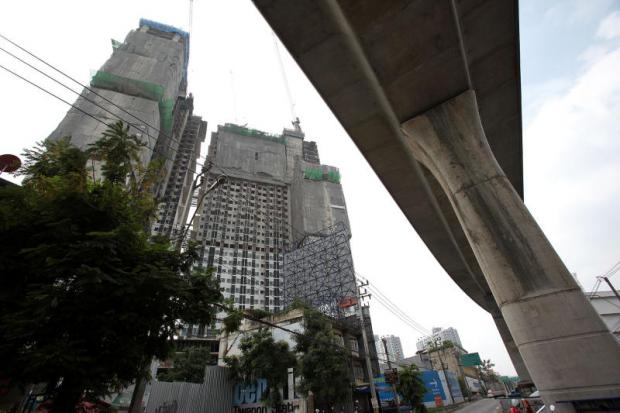
The property market will slow next year amid negative factors such as new mortgage lending requirements, an uptrend in interest rates and the prolonged US-China trade war, according to developers and experts.
Atip Bijanonda, president of the Housing Business Association, said the US-China trade dispute may have an impact on the Thai economy. If the economy is soft and interest rates rise, consumer confidence will drop.
"The economic situation has a strong impact on the condo market, as condo buyers need confidence when buying a condo, the process for which usually takes 24-30 months to complete," Mr Atip said yesterday at a seminar on the housing market held by the Real Estate Information Center (REIC).
He said the general election will affect the economy if the government has no stability or has a mix of parties without unity. Government policy on infrastructure projects will dampen investor sentiment if it discontinues, is frozen or slows down.
Vichai Viratkapan, the REIC's acting director-general, said property developers should check residential stock in each location where they want to develop a new project before making a decision.
"The new lending rules will boost the absorption rate in the first half next year to 4.8% from 4.5% in the first half this year, but it will drop to 4.2% in the second half as the new rules take effect on April 1, 2019," Mr Vichai said.
According to the REIC, total residential supply in Greater Bangkok at projects that had at least six units remaining unsold as of the first half of this year rose 0.3% year-on-year to 452,614 units at 1,494 projects.
The key driver was condos, which increased by 4.5% to 253,899 units at 453 projects. The total amount of low-rise supply dropped 4.6% to 198,715 units.
In Greater Bangkok, the largest amount of condo supply remaining unsold in the first half of 2018 was in Muang and Pak Kret districts in Nonthaburi, with 9,002 units worth a combined 23.57 billion baht.
Bangkok was followed by Muang, Phra Pradaeng and Phra Samut Chedi districts of Samut Prakan with 6,645 units worth 13.4 billion baht. Huai Khwang-Chatuchak-Din Daeng came third with 6,493 units worth 26.61 billion baht.
Taling Chan-Bang Kae-Phasi Charoen-Nhong Kham-Thawi Watthana had 4,954 units worth 11.2 billion baht, and Thon Buri-Klong San-Bangkok Noi-Bangkok Yai-Bang Phlat posted 4,617 unsold units worth 14.9 billion baht.
In the low-rise segment, the Lam Lukka-Klong Luang-Thanyaburi-Nhong Sue area saw the largest number of unsold units with 13,437 worth 46.76 billion baht.
Bang Yai-Bang Bua Thong-Bang Kruay-Sai Noi had 11,367 unsold units worth 47.72 billion baht, followed by Bang Phli-Bang Bo-Bang Sao Thong with 9,327 units worth 37.23 billion baht.
Muang, Phra Pradaeng and Phra Samut Chedi districts of Samut Prakan came fourth with 5,367 units worth 16.28 billion baht. Klong Sam Wa-Min Buri-Nhong Chok-Lat Krabang had 4,704 units worth 21 billion baht.
"All of the top five locations in the low-rise segment were townhouses, and four of them were units priced at 2-3 million baht, the same as the condo segment," Mr Vichai said.
Nalinrat Chareonsuphong, managing director of property consultant Nexus Property Marketing Co, said condo developers may need to rely on foreign buyers as the new lending rules start to affect some buyers.
"Foreigners buy Thai property due to lower prices, higher yields and capital gains, and to use as a second or holiday home," she said. "Some want to move capital from their home country and escape unattractive interest rates."
According to Nexus, new condo supply totals 55,000-60,000 units a year, while demand this year was 50,000 units. Of the amount, 10% was acquired by foreigners.
Chinese buyers were the main overseas buyers, with strong growth in 2017-18.
Growth from Chinese will slow next year because many found the prices they paid to be higher than what Thais pay.